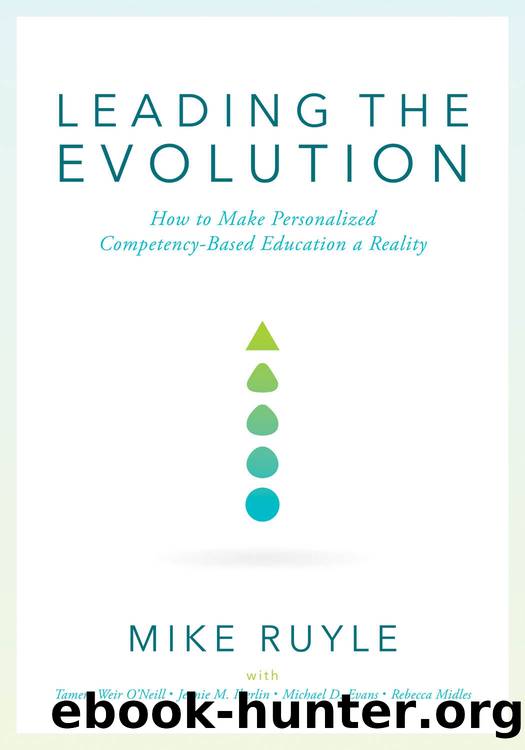Leading the Evolution by Ruyle Mike;O'Neill Tamera Weir;Iberlin Jeanie M.;Evans Michael D.;Midles Rebecca;

Author:Ruyle, Mike;O'Neill, Tamera Weir;Iberlin, Jeanie M.;Evans, Michael D.;Midles, Rebecca;
Language: eng
Format: epub
Publisher: Marzano Resources
Published: 2018-08-15T00:00:00+00:00
âRewarding short-term growth is important, because this whole shift will take time and energy to make it happen long term. Teachers and kids need to be celebrated regularly. . . . It creates an infectious energy.â
âMiddle school teacher, Colorado
Being Personally Involved in Developing Curriculum, Instruction, and Assessment
Teachers in effective PCBE schools continually stress the importance of feeling that their leaders are actively involved with them in the trenches when learning how to operate curriculum, instruction, and assessment in the new model. It is critical for principals to roll up their sleeves and get into the deep work of identifying learning goals, creating proficiency scales, aligning assessments with the scales, and adjusting instruction based on assessment data. Being personally involved in the development of curriculum, instruction, and assessment epitomizes the lifelong learner and is exceedingly important; it lends credibility to the principal as a true educational leader. This specific behavior can be a challenging part of a principalâs job, yet evolutionary change will simply not happen without highly informed leaders who effectively communicate knowledge of curriculum, instruction, and assessment.
Although knowledge of curriculum, instruction, and assessment is an important responsibility for leaders to cultivate during the evolution to a PCBE model, personal, hands-on involvement in curriculum, instruction, and assessment is even more critical. Marzano et al. (2005) advised leaders to be directly involved in helping teachers design curricular activities and address instructional and assessment issues. These behaviors are the essence of transformational instructional leadership. Leaders donât simply delegate responsibility to evolve schools and classrooms; they are actively involved in learning the new system personally and helping teachers grow and evolve as well. Because virtually all principals were teachers with their own areas of expertise, knowledge, and skill at some point, they may find it daunting to give advice to teachers who are experts in other content areas. But the PCBE system is usually new for everyone, and it is important for principals to get involved in the evolution at the ground levelâthat is, in the classroom itself. Mindful leaders are humble enough to be in professional meetings and successful classrooms where they learn from their educational colleagues, and then take that knowledge to the entire group. This is the time not to sit on the sidelines but rather to get in the game and have the impact necessary to improve systems.
Administrative collaborative teams play a critical role by providing time for leaders to discuss and become more adept in the theoretical as well as practical issues in education today, making them better able to cultivate, implement, and lead the initiative long term.
âItâs painfully obvious when principals donât really know what theyâre talking about. They talk in circles and itâs not clear. You just want to tell them to stop talking! Or else, even worse, they just back off completely and tell teachers to collaborate and figure it out. Thatâs cowardice and nothing gets done. The principal here rolled up her sleeves and got right in there with usâevery step of the way. We learned it together and were all on the same page.
Download
This site does not store any files on its server. We only index and link to content provided by other sites. Please contact the content providers to delete copyright contents if any and email us, we'll remove relevant links or contents immediately.
Chicken Soup for the Soul Presents Teens Talkin' Faith by Jack Canfield(689)
Understanding PDA Autism in Kids: A Guide for Parents and Teachers to Support Neurodiverse Learners by Jehu Len(558)
The Victorian Era: A Captivating Guide to the Life of Queen Victoria and an Era in the History of the United Kingdom Known for Its Hierarchy-Based Social Order by Captivating History(428)
Brain Teasers to Build Critical Thinking Skills: Brain Exercises for Tech, Banking, Case Interview Prep, and to Keep Your Mind Sharp by Kris Safarova(415)
Brain Teasers to Build Critical Thinking Skills by Safarova Kris(412)
100 Ideas for Secondary Teachers: Engaging Parents by Janet Goodall & Kathryn Weston(390)
Python 101 - Fundamentals by Sam(375)
Critical Curriculum Leadership : A Framework for Progressive Education by Rose M. Ylimaki(365)
Writing Solid Code: Development Philosophies for Writing Bug-Free Programs by Steve Maguire(360)
The Art of Emotional Validation: Improve Your Communication Skills and Transform Your Relationships by Validating Emotions and Feelings by Emily Wright(339)
Intersectionality in Educational Research by Dannielle Joy Davis; James L. Olive; Rachelle J. Brunn-Bevel; Susan R. Jones(335)
The Knights Templar: An Enthralling History of the Rise and Fall of the Most Influential Catholic Military Order by Wellman Billy(330)
A Beginner's Guide to SSD Firmware by Unknown(328)
The Future Knowledge Compendium by Ellyard Peter;(319)
How to be assertive in any situation by Hadfield Sue & Hasson Gill(311)
Foundations of Educational Research by Victoria Elliott(307)
Making Connections in and Through Arts-Based Educational Research by Hala Mreiwed Mindy R. Carter Sara Hashem Candace H. Blake-Amarante(306)
What Every Teacher Should Know about Learning, Memory, and the Brain by Tileston Donna E. Walker;(306)
Message from the Pleiades; The Contact Notes of Eduard Billy Meier v1 only by unknow(302)
